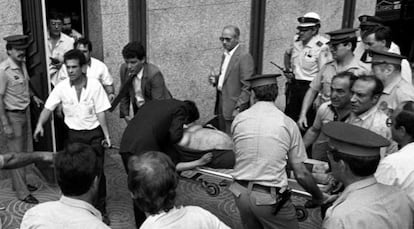"You don't know the hell you created"
A victim of the 1987 Barcelona bombing comes face to face with one of the perpetrators The explosion in a busy supermarket was ETA's bloodiest ever attack


Last November, Rosa sat face to face with the former head of ETA's Barcelona cell, Rafael Caride Simón. Their lives crossed tragically 25 years ago, on June 19, 1987. She was buying groceries at a Hipercor supermarket with her husband and their three-year-old son, as they did every Friday. At 4.10pm they were upstairs, in the fruit department, when "the ceiling started to cave in on us." ETA had detonated a car bomb in the parking lot.
Besides sustaining multiple injuries, Rosa lost the hearing in one ear and has been seeing a psychologist ever since. It was the terrorist group's bloodiest attack ever, an indiscriminate massacre that killed 21 people - most due to burns or asphyxiation - and wounded another 45.
The head of the cell that perpetrated the attack, Caride Simón, was sentenced to 790 years in jail, together with four associates. Now aged 62, he is serving his sentence in Zaballa (Álava), but in late November 2011 he was taken to Navalcarnero penitentiary in Madrid to testify in a trial at the High Court. It was there that he met Rosa as part of a program of ETA-victim meetings, which was initiated by the previous Socialist government. To date, there have been 11 such meetings and the new conservative government of Mariano Rajoy has included them in its new prisoner rehabilitation program.
The victim, Rosa M. P., would rather not give out her surnames because her children are unaware of her meeting with Caride Simón. "It's a difficult subject. I still can't talk to my son about it," she says.
Rosa remembers she was nervous on the appointed day, and that it was cold inside the prison. "The coldness of jail is terrible," she says. "It's out of the ordinary. It chills your bones. When we got there, the prison director greeted us, and then doors started to open and close, just like in a movie."
Eventually, Rosa and two mediators were taken to a room with two tables and four chairs, and a mirror at the far end. A while later, Caride Simón entered the room. They shook hands, and following a mediator's introduction, they started to talk. Rosa had questions she'd been keeping inside for years.
One of her questions was how he felt after seeing what they'd done. Caride Simón claimed they called the police three times, and that he personally phoned a fourth time to warn them about the bomb, but that the police ignored the warning. Then, when they saw the images on TV of the bombed supermarket, they kept saying: "Fuck, fuck..."
Then Rosa told him what it was like inside. "Suddenly, the entire ceiling caved in on me. It was like knives falling on people, cutting bodies. There was a lot of smoke, a lot of fire. My husband dragged my son, me and another girl out of there. We walked out among the flames. When we grabbed each other, pieces of flesh came off in our hands. There were a lot of bloodied people, burnt people. People were yelling, 'The gas, the gas, it's going to explode!' We went upstairs and I can't tell you anything else because I can't remember what happened then. But I can tell you that 15 days later I could have jumped off the balcony, because my life had no meaning. You shattered my life. Watching people fly in all directions is an image I will never forget. You don't know what kind of a hell you created."
The convicted terrorist told her he realized the hurt he'd caused and that killing is not the way to achieve political objectives. He said he'd had trouble with ETA when he started to break away from it, because it's much easier to join a terrorist group than to leave it.
Tu suscripción se está usando en otro dispositivo
¿Quieres añadir otro usuario a tu suscripción?
Si continúas leyendo en este dispositivo, no se podrá leer en el otro.
FlechaTu suscripción se está usando en otro dispositivo y solo puedes acceder a EL PAÍS desde un dispositivo a la vez.
Si quieres compartir tu cuenta, cambia tu suscripción a la modalidad Premium, así podrás añadir otro usuario. Cada uno accederá con su propia cuenta de email, lo que os permitirá personalizar vuestra experiencia en EL PAÍS.
¿Tienes una suscripción de empresa? Accede aquí para contratar más cuentas.
En el caso de no saber quién está usando tu cuenta, te recomendamos cambiar tu contraseña aquí.
Si decides continuar compartiendo tu cuenta, este mensaje se mostrará en tu dispositivo y en el de la otra persona que está usando tu cuenta de forma indefinida, afectando a tu experiencia de lectura. Puedes consultar aquí los términos y condiciones de la suscripción digital.








































